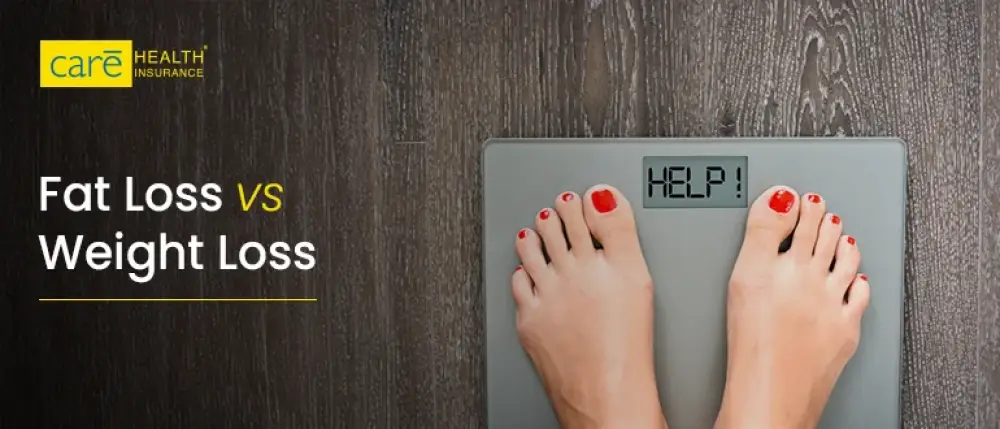When it comes to looking after your body and dropping weight, people use the terms fat loss and weight loss interchangeably. But do you know these are two entirely different goals with vastly different impacts on your body?
Whether you are running daily or following a strict diet, understanding the distinction between body fat loss and weight loss can help you adopt a healthier lifestyle.
What is Weight Loss?
Weight loss refers to the reduction in the total body weight. This weight includes not just fat but also muscle, water, and even bone density. While the number on the weighing machine may drop, it doesn't always indicate improved health.
Causes of Weight Loss
Weight loss can be intentional, resulting from lifestyle changes such as dieting or increased physical activity. Unintentional weight loss may result from medical conditions such as hyperthyroidism, diabetes, cancer, chronic infections, or gastrointestinal disorders. Psychological causes like depression, anxiety, or eating disorders, as well as medications and substance use, can also contribute.
Here are some common causes of weight loss-
- Calorie deficit: The calorie deficit particularly means eating fewer calories than your body needs, which leads to weight loss.
- Dehydration: Dehydration reduces water weight temporarily.
- Loss of muscle tissue: When dieting, unwillingly, we may lose muscle along with fat.
- Medical conditions: Typically, certain medical conditions or treatments, such as those that reduce appetite or require low-calorie diets, are prescribed by doctors.
Losing weight rapidly through crash diets or over-exercising can often lead to muscle loss and poor metabolic health.
What is Fat Loss?
Fat loss, on the other hand, refers to the targeted reduction of body fat while maintaining or even building the muscles. This approach ensures a leaner, healthier physique with better metabolism and improved strength.
Benefits of Fat Loss
Fat loss improves heart health, lowers the risk of diabetes, and reduces strain on joints and organs. It also boosts energy, enhances mobility, and improves overall confidence and quality of life.
Here are some of the benefits of fat loss
- Maintains the muscle tone
- Boosts metabolism
- Reduces the risk of chronic illness
- Improves overall body composition
Are Fat Loss and Weight Loss the Same?
No. They are not the same. Losing weight can mean losing muscle and water weight, whereas losing fat is more about improving your body composition. It is possible to lose fat without losing much weight, and that is often a healthier outcome.
Weight loss and fat loss are often used interchangeably, but they’re not the same. Weight loss refers to a decrease in overall body weight, which includes fat, muscle, and water. On the other hand, fat loss targets explicitly the reduction of body fat while preserving muscle mass. Crash diets or excessive cardio may lead to quick weight loss, but often at the expense of muscle and water. In contrast, a balanced approach that combines strength training with proper nutrition promotes fat loss, yielding healthier and more sustainable results. So, the goal shouldn’t just be weight loss; it should be smart fat loss.
Here are some factors that differentiate between fat loss and weight loss-
| FACTORS | WEIGHT LOSS | FATLOSS |
|---|---|---|
| Focus area | Total body weight | Body fat percentage |
| Method | Calorie deficit | Calorie deficit + strength training |
| Muscle Mass | Often lost | Preserved or increased |
| Health Impact | May reduce strength/metabolism | Improves metabolic health |
| Long Term Results | Temporary | Sustainable |
| Measurement Tools | Weighing scale | Body fat callipers |
Burning Fat Vs Losing Weight: What Should You Aim For?
If your goal is to look leaner, stay healthy, and retain muscle, burning fat is a better target than simply losing weight. The scale may not reflect your body, but your body composition certainly does.
Tips to focus on fat loss:
- Eat high-protein meals to retain muscle.
- Incorporate strength training to improve your strength as well
- Avoid crash diets, and make sure to eat meals at regular intervals.
- Get proper 7 to 8 hours of sleep daily to support muscle repair
- You must monitor your body fat percentage, not just your weight.
Maintaining a healthy body fat percentage reduces the risk of:
- Heart disease
- Type 2 diabetes
- High blood pressure
- Obesity related complications
Pro Tip: Many health insurance providers offer wellness benefits, which include gym and studio memberships, preventive check-ups, and discounts for policyholders who maintain a healthy lifestyle.
A Steady Note to End On
Focusing only on the scale can be misleading. Instead, the goal should be to burn the fat, not just lose weight. By combining a proper diet with sufficient protein, strength training, and sustainable habits, you will not only feel better but also improve long-term health outcomes. Losing weight does not always mean losing fat, and understanding this difference is crucial for achieving real health benefits. Rapid weight loss often reflects water loss or muscle breakdown, which can harm metabolism and overall well-being.
>>Read More: Health Insurance Articles/top Superfoods For Weight Loss Success
Disclaimer: The above information is for reference purposes only. Kindly consult your general physician for verified medical advice. The health insurance benefits are subject to policy terms and conditions. Refer to your policy documents for more information.
